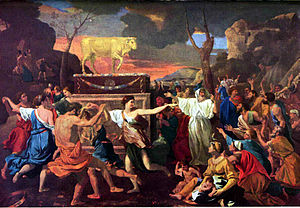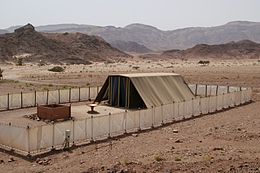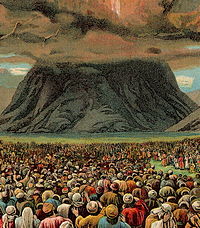Bible: What Does Leviticus 26-27 Teach Us About Redemption?
Idolatry

The Tabernacle

Benefits for Obedience
Before He sets down promises of blessing and retribution for Israel, Yahweh reiterates and elaborates a little more upon two prior commandments:
(1) Do not carve or engrave images or pillars to worship; in other words, do not be idolaters;
(2) Observe Sabbaths and treat His sanctuary as holy (vv. 1-2).
Israel’s obedience to God’s statutes will bring this nation the following benefits:
(1) agricultural prosperity (bumper crops every year) [vv. 3-5],
(2) domestic tranquility (v. 6),
(3) overwhelming military victory (vv. 7-8),
(4) numerical increase (v. 9),
(5) abundant food (v. 10), and
(6) intimate fellowship with their covenant God who redeemed him from Egypt (vv. 11-13).
The LORD's Commandments

Desperate Times, Desperate Measures
view quiz statisticsOn the other hand, if Israel fails to obey God’s commandments (vv. 14-15), the people will suffer horrible retribution—the triplet of disease, dearth, and defeat (vv. 16-17).
The LORD will levy even more chastening upon His people (as follows) if they refuse to repent (v. 18):
(1) Israel will suffer a complete agricultural standstill (vv. 19-20).
(2) Plagues also will increase through wild beasts (vv. 21-22);
(3) More disobedience will meet with judgment by enemies (the sword [vv. 24-25]), pestilence (v. 25), and privation (v. 26).
If Israel still refuses to turn, the people will one day turn cannibalistic (vv. 27-29), suffer destruction of their false worship centers and cities (vv. 30-31, 33), desolation of their land (vv. 32-33), and become hunted outcasts and exiles in the world (v. 33).
Only then will the Land enjoy its long-withheld Sabbaths (vv. 34-35).
[Notice the formula God uses to teach Israel the increasing severity of punishment: “If you continue . . . , then I will punish you seven times more for your sins” (vv. 18, 21, 24, 28)].
The remnant will live in fear, fleeing from enemies who do not pursue them and falling down over one another (vv. 36-37).
They will be exiles and waste away in their iniquities and those of their fathers until death relieves them (vv. 38-39).
Confession of their sins and the sins of their fathers, on the other hand, will rescue them, causing God to “remember” His covenant with the patriarchs and with the Land (vv. 40-42).
The land will still enjoy its rest (v. 43); the remnant will suffer in exile, but not be destroyed (v. 44).
God will remember the covenant for their sake (v. 45).
Verse 46 summarizes this entire section.
Non-Redeemable
view quiz statisticsLeviticus 27
Redemption of persons and property dedicated to God is the final topic of instruction.
For males in their prime (20-60 years old), the price is the highest; females in the same age group are valued much lower (vv. 1-4).
Younger males (5-20) expect twice as much as females of this age (v. 5); the cost ratio of male infants and toddlers to females is 5:3 (v. 6).
For those over sixty the ratio is 3:2 (v. 7).
These rates hold fast unless the one seeking to redeem is too poor to pay them; in this case, the redeemer must seek out the priest for a fair valuation (v. 8).
Animals brought to God must be holy; the owner may not exchange or substitute animals so dedicated, except the one substituted is also holy (vv. 9-10).
Israel must bring unclean animals to the priest for his valuation; if the individual desires to redeem such a beast, he must add twenty percent to the priest’s valuation (vv. 11-13).
The priest also sets a value on houses dedicated to God; the one who desires to redeem his house must pay an extra fifth to receive it back (vv. 14-15).
Dedicated fields are valued according to the value of barley seed (v. 16).
Depending upon when the Israelite dedicates his field—before or after Jubilee—the priest must follow certain standards of valuation (vv. 17-18).
Redemption will cost him an extra twenty percent.
If he does not wish to redeem it, no one else may; at the Jubilee, this “devoted field” belongs to the priest (vv. 19-21).
Priests value fields bought and dedicated to God, but not belonging to the buyer, and “reckon” to him their worth up to the year of Jubilee (vv. 22-23).
The fields revert to their original owners in the Jubilee year (v. 24).
Everything is valued according to the strict guidelines of the sanctuary (v. 25).
No one dedicates the firstborn of clean animals, oxen or sheep (v. 26).
One may redeem unclean ones at the valuation cost plus one-fifth; non-redeemed beasts are sold (v. 27).
Offerings devoted exclusively to the LORD cannot be redeemed.
People “under the ban” must be put to death; they are not redeemable (vv. 28-29).
Tithes belong to God; if one desires to redeem any tithe, he must add one-fifth to it (vv. 30-31).
The tenth of animals, of whatever “passes under the rod,” belongs to God; it cannot be redeemed (vv. 32-33).
Another summary statement appears to finish the section and to complete the book (v. 34).
[The subject of the redemption of persons, animals, and property is practically foreign to Western thought; thus, students should deem it worthy of more intense investigation].
SUMMARY QUESTIONS
1. Name the various kinds of sacrifices.
2. What may have been the transgression of Nadab and Abihu?
3. Interact with the concept of slavery in Israelite culture.
4. What is the “Year of Jubilee,” and what events occur during that time?
5. Study the concept of redemption, and explain its significance in Israel.
6. What were the qualifications for many animal sacrifices?
7. What ritual was involved in the consecration of priests?
8. What specific point about Israel did Yahweh want to make through His institution of the entire sacrificial system and other laws?
9. What happens on Yom Kippur?
10. Discuss the treatment of leprosy.
11. What features qualify an animal to be clean?
12. What are some requirements for the priesthood?
13. Which sons of Aaron replaced those who died in shame?
14. What does a peace offering express?
15. What other foods do the priests eat with the sacrificial meat offering?
16. What does the “blood” do for the soul?
17. What is the procedure for sacrificing animals?
18. What the ingredients are included in grain offerings?
19. What will happen when Israel fails to obey God’s statutes?
20. What blessings would Israel enjoy if he obeys God’s commandments?
21. What types of sexual impurities does Leviticus condemn?
22. Describe the cleansing of a leper.
23. What disqualifies a priest from service?
24. What is the function of the “scapegoat”?
25. What two reasons does God offer for forbidding priests to drink alcoholic beverages?
26. What does the phrase “cut off from his people” signify?
27. What is the role of the “kinsman redeemer”?
28. Why (in general) does it cost less to redeem the old, the very young, and females?
© 2014 glynch1








